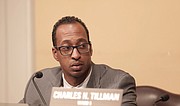Last month, I read Donna Ladd's article about violence, gangs, policing, teens, education, drugs and poverty in Jackson ("A Hunger to Live: The Struggle to Interrupt the Cycle of Violence in Jackson", April 20, 2016, posted at jfp.ms/preventingviolence).
Regardless of your thoughts about crime in the City, I strongly encourage you to take the time to read the article. It is the most in-depth policy piece anyone has done on crime, poverty and ideas for dealing with crime (other than "lock 'em up, throw away the keys") in Jackson for quite some time.
"When is the City going to get serious about crime?" outstrips even "When are you going to fix that pothole?" as the most common question I receive as a city councilperson. From social media sites like nextdoor.com to neighborhood forums in the Queens and Presidential Hills, it's clear that the people of Jackson desperately want to see a reduction in crime.
Because the people of Jackson are so frustrated at the moment about crime, it is tempting for us as civic leaders to do something, anything, regardless of its actually efficacy. At the same time, if an approach to crime can't be condensed to look good on a push card or a social media site, it's hard for us to create the space to consider or advocate for innovative approaches to reducing crime.
Given those realities, it's critical for the City of Jackson to have solid coverage of our efforts to try new approaches at crime reduction. It is equally critical that the citizens of Jackson engage with such reporting.
Ms. Ladd's recent article is, to my knowledge, the only reporting that covers what happened with the Metro Area Crime Elimination program that received so much coverage last year. Her exploration of how this attempt to reduce crime played out in practice is significant. As Ms. Ladd noted, "Mayor Yarber was straightforward that the program wasn't executed as it was designed to be, even after his administration and others made a 'grand announcement' about the program's potential."
"Well, I think a couple of real important pieces were missing," Yarber told the JFP. That included "social development after we went in and cleaned up the neighborhoods." That is, the carrot. In addition, he said, "We didn't do as good a job as we should have on data collection."
The evaluation of that program was appreciated. Yet, what I appreciated even more in Ms. Ladd's article was her attention to Mr. John Knight. Quoting Mayor Yarber, "If you lived in Jackson growing up ... you knew John Knight's name. He and his crew ran the streets." Mr. Knight spoke during public comments a few weeks ago at a city council meeting and made an impassioned plea to the mayor and council to work collaboratively with him to fight crime.
The idea of working with a former drug dealer to prevent violence turns the usual conceptions about crime fighting on their heads. Perhaps, however, we should join Ms. Ladd and Mayor Yarber in considering whether Mr. Knight and men and women like him can be effective in combating violence in the City after causing so much of it. With regards to Mr. Knight, Ms. Ladd quotes Dr. Gary Slutkin, a medical doctor and epidemiology professor at the University of Illinois at Chicago Public School of Health. Dr. Slutkin has championed an epidemiological/public-health approach to violence prevention called Cure Violence (cureviolence.org). Dr. Slutkin notes that "it sounds like the city is missing the structure around (Mr. Knight), and enough of him." Ms. Ladd reports that the mayor is more guarded, saying he is "not sure how to use (Mr. Knight) just yet."
Like Mayor Yarber, I can't say yet whether Mr. Knight is the genuine deal. I do know, however, that working with him or people with a similar background is not a crazy idea. Richmond, Calif., for example, has been hiring people like Mr. Knight for "Peacemaker Fellowships" via an "Office of Neighborhood Safety." Cities around the country have implemented or are evaluating similar programs.
What happened with the Capitol Complex Bill shows the extent to which Jackson's crime issues supersede and impact even our infrastructure woes. We're at a point where everything should be on the table if it's effective. We need to try new things, plain and simple. To do that, we need to be able to see what other places are doing.
At the same time, when we do try new things like MACE, we need to know what happened and if these new methods were effective and implemented as promised (or not). Simply put, we need to be pragmatic, experimental and accountable. Ms. Ladd's article touches on all of those themes while at the same time putting a human face on kids we so readily dismiss as "thugs." You genuinely should spend the time to read her whole article, and I look forward to the publication of any follow-up coverage.
Read and comment on the article and several follow-ups at jfp.ms/preventingviolence. Melvin Priester Jr. is the Jackson City Council president and represents Ward 2.
More like this story
- Former Criminals Training to Stop Violence in Jackson with $150,000 Grant
- Solutions: How to Prevent Gun Violence
- Ending Viral Violence: Strong Arms of Jackson Holds Rally Against Gun Crime
- A Violence Talk That Might Have Been
- Mayor Yarber on Crime: Saw ‘7 or 8 Dead Bodies’ Before Age 13, All Must 'Get Out of Our Bubble'



Comments
Use the comment form below to begin a discussion about this content.
comments powered by Disqus